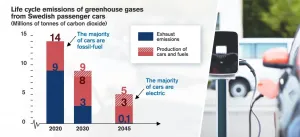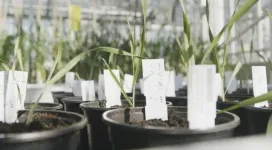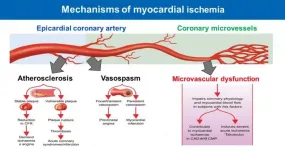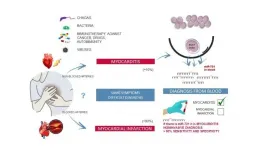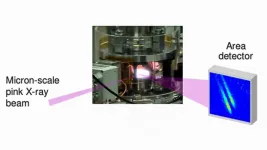(Press-News.org) If a ban were introduced on the sale of new petrol and diesel cars, and they were replaced by electric cars, the result would be a great reduction in carbon dioxide emissions. That is the finding of new research from Chalmers University of Technology, Sweden, looking at emissions from the entire life cycle - from manufacture of electric cars and batteries, to electricity used for operation. However, the total effect of a phasing out of fossil-fuelled cars will not be felt until the middle of the century - and how the batteries are manufactured will affect the extent of the benefit.
A rapid and mandatory phasing in of electric cars could cause emissions from Swedish passenger cars' exhausts to approach zero by 2045. The Swedish government has proposed an outright ban on the sale of new fossil fuel cars from the year 2030 - but that alone will not be enough to achieve Sweden's climate targets on schedule.
"The lifespan of the cars currently on the roads and those which would be sold before the introduction of such a restriction mean that it would take some time - around 20 years - before the full effect becomes visible," says Johannes Morfeldt, researcher in Physical Resource Theory at Chalmers University of Technology and lead author of the recently published scientific study.
To have the desired effect, a ban would either need to be introduced earlier, by the year 2025, or, if the ban is not brought in until 2030, then the use of biofuels in petrol and diesel cars needs to increase significantly before then - in accordance with the revised Swedish "reduction obligation". The combination of these two measures would have the effect of achieving zero emissions from passenger vehicles and keeping to Sweden's climate targets.
"The results from our study show that rapid electrification of the Swedish car fleet would reduce life cycle emissions, from 14 million tonnes of carbon dioxide in 2020 to between 3 and 5 million tonnes by the year 2045. The end result in 2045 will depend mainly on the extent to which possible emission reductions in the manufacturing industry are realised," says Johannes Morfeldt.
A transition from petrol and diesel cars to electric cars will mean an increased demand for batteries. Batteries for electric cars are often criticised, not least for the fact that they result in high levels of greenhouse gas emissions during manufacture.
"There are relatively good opportunities to reduce emissions from global battery manufacturing. Our review of the literature on this shows that average emissions from global battery manufacturing could decrease by about two thirds per kilowatt hour of battery capacity by the year 2045. However, most battery manufacturing takes place overseas, so Swedish decision-makers have more limited opportunities to influence this question," says Johannes Morfeldt.
From a climate perspective, it does not matter where the emissions take place, and the risk with decisions taken at a national level for lowering passenger-vehicle emissions is that they could lead to increased emissions elsewhere - a phenomenon sometimes termed 'carbon leakage'. In this case, the increase in emissions would result from greater demand for batteries, and the risk is thus greater the higher the emissions from battery production.
In that case, the Swedish decision would not have as great an effect on reducing the climate impact as desired. The life-cycle emissions would end up in the upper range - around 5 million tonnes of carbon dioxide instead of around 3 million tonnes. Due to this, there may be reason to regulate emissions in both vehicle and battery production, from a life cycle perspective.
"Within the EU, for example, there is a discussion about setting a common standard for the manufacture of batteries and vehicles - in a similar way as there is a standard that regulates what may be emitted from exhausts," says Johannes Morfeldt.
But, given Sweden's low emissions from electricity production, a ban on sales of new fossil-fuel cars would indeed result in a sharp reduction of the total climate impact, regardless of how the manufacturing industry develops.
The results of the study are based on Swedish conditions, but the method used by the researchers can be used to obtain corresponding figures for other countries, based on each country's car fleet and energy system. The year 2045 is highlighted because that is when greenhouse gas emissions within Sweden should reach net zero according to the climate policy goals of the country.
INFORMATION:
Read more about the revised Swedish "reduction obligation":
http://www.energimyndigheten.se/en/sustainability/sustainable-fuels/greenhouse-gas-reduction-mandate/
Urgent investment in new tools is needed to address major global losses of wheat crops which cost £22 billion per year.
Leading scientific experts are calling for governments around the world to come together and fund a new international research platform, to reduce the impact of major wheat pathogens and improve global food security.
The John Innes Centre is calling for an internationally coordinated approach to deliver a new 'R-Gene Atlas', which would help identify new genetic solutions conferring disease resistance for crops, which could be bred into commercial wheat varieties.
Globally, we lose one fifth of the projected wheat yield annually to pests and pathogens totaling losses of 209 million tonnes, worth £22 billion ($31 billion). The climate emergency has the ...
Each city has its own unique microbiome, a "fingerprint" of viruses and bacteria that uniquely identify it, according to a new study from an international consortium of researchers that included a team from the University of Maryland School of Medicine (UMSOM). The international project, which sequenced and analyzed samples collected from public transit systems and hospitals in 60 cities around the world, was published today in the journal Cell.
The research is considered to be the largest-ever global metagenomic study of urban microbiomes, spanning both the air and the surfaces of multiple cities. It features a comprehensive ...
New research has discovered that monkeys will use the "accent" of another species when they enter its territory to help them better understand one another and potentially avoid conflict.
Published in the journal Behavioral Ecology and Sociobiology, the study is the first to show asymmetric call convergence in primates, meaning that one species chooses to adopt another species' call patterns to communicate.
The study, co-authored by Dr Jacob Dunn of Anglia Ruskin University (ARU), investigated the behaviour of 15 groups of pied tamarins (Saguinus bicolor) and red-handed tamarins (Saguinus midas) in the Brazilian Amazon.
Pied tamarins are critically endangered and have one of the smallest ...
For the first time, a prospective, international study has shown that chest pain caused by problems with the very small vessels supplying blood to the heart is an important health problem that increases the risk of heart attacks, stroke and death due to cardiovascular reasons.
The study, which is published today (Thursday) in the European Heart Journal [1], recruited 686 patients from 14 institutions in seven countries on four continents [2] between July 2015 and December 2018 to investigate microvascular angina (MVA). Until now, MVA was widely thought to be a benign disease that mainly occurs in women. However, the ...
Half a billion tonnes of carbon emissions could be cut from Earth's atmosphere by improved management of peatlands, according to research partly undertaken at the University of Leicester.
A team of scientists, led by the UK Centre for Ecology and Hydrology (UKCEH), estimated the potential reduction of around 500 million tonnes in greenhouse gas (GHG) emissions by restoring all global agricultural peatlands.
Peatlands - a type of wetland, where dead vegetation is stopped from fully breaking down - cover just 3% of the global land surface, but store around 650 billion tonnes of ...
Highlights
Among patients receiving dialysis in the Southeastern United States, those at for-profit dialysis facilities were less likely to be referred for kidney transplantation than those at non-profit facilities.
Rates of starting medical evaluations soon after referral and placing patients on a waitlist after evaluations were similar between the groups.
Washington, DC (May 26, 2021) -- New research indicates that patients with kidney failure who receive care at for-profit dialysis facilities are less likely to be referred for kidney transplants that those receiving care at non-profit ...
Scientists at the Centro Nacional de Investigaciones Cardiovasculares (CNIC) have identified the first blood biomarker for myocarditis, a cardiac disease that is often misdiagnosed as myocardial infarction. Nevertheless, the diagnosis of myocarditis continues to be challenging in clinical practice.
The study, led by Dr. Pilar Martín and published today in The New England Journal of Medicine, has detected the presence of the human homolog of micro RNA miR-721 in the blood of myocarditis patients.
CNIC General Director Dr. Valentín Fuster emphasizes that these results of paramount importance because they establish the first validated blood marker with high sensitivity and specifity (>90%) for myocarditis. This will allow ...
Continuous skin-to-skin contact starting immediately after delivery even before the baby has been stabilised can reduce mortality by 25 per cent in infants with a very low birth weight. This according to a study in low- and middle-income countries coordinated by the WHO on the initiative of researchers at Karolinska Institutet published in The New England Journal of Medicine.
Continuous skin-to-skin contact between infant and mother, or "Kangaroo Mother Care" (KMC), is one of the most effective ways to prevent infant mortality globally. The current recommendation from the World Health Organization (WHO) is that skin-to-skin contact should commence ...
ITHACA, N.Y. - Soil carbon storage, carbon capture and storage, biochar - mention these terms to most people, and a blank stare might be the response.
But frame these climate change mitigation strategies as being clean and green approaches to reversing the dangerous warming of our planet, and people might be more inclined to at least listen - and even to back these efforts.
A cross-disciplinary collaboration led by Jonathon Schuldt, associate professor of communication at Cornell University, found that a majority of the U.S. public is supportive of soil carbon storage as a climate change mitigation strategy, particularly when that and similar approaches are seen as "natural" strategies.
"To me, that psychology part - that's really interesting," Schuldt ...
With brilliant colors and picturesque shapes, many crystals are wonders of nature. Some crystals are also wonders of science, with transformative applications in electronics and optics. Understanding how best to grow such crystals is key to further advances.
Scientists from the U.S. Department of Energy's (DOE) Argonne National Laboratory, along with three universities, have revealed new insights into the mechanism behind how gallium nitride crystals grow at the atomic scale.
Gallium nitride crystals are already in wide use in light-emitting diodes, better known as LEDs. They might also be applied to form transistors for high-power switching electronics to make electric grids more energy efficient and smarter. The use of such "smart grids," which ...
